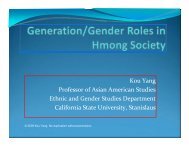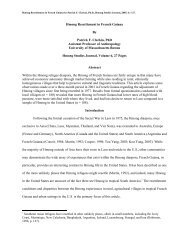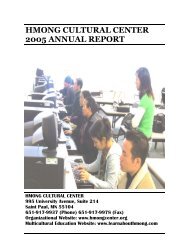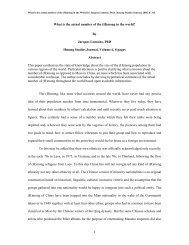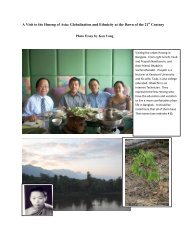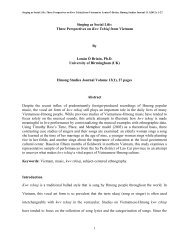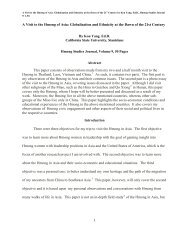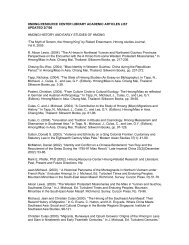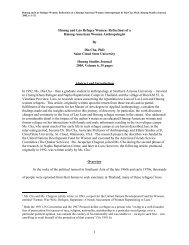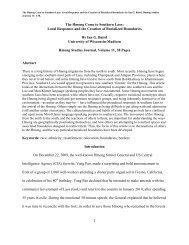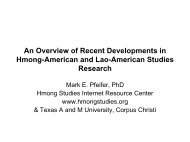Research Notes from the Field - Hmong Studies Internet Resource ...
Research Notes from the Field - Hmong Studies Internet Resource ...
Research Notes from the Field - Hmong Studies Internet Resource ...
Create successful ePaper yourself
Turn your PDF publications into a flip-book with our unique Google optimized e-Paper software.
<strong>Research</strong> <strong>Notes</strong> <strong>from</strong> <strong>the</strong> <strong>Field</strong>:Tracing <strong>the</strong> Path of <strong>the</strong> Ancestors – A Visit to <strong>the</strong> <strong>Hmong</strong> in China by Kou Yang, EdD,<br />
<strong>Hmong</strong> <strong>Studies</strong> Journal, 2005, 6: 1-38.<br />
to <strong>the</strong> observation of Lewis and Lewis (1984:133) stating, “The <strong>Hmong</strong> are hospitable, always ready to<br />
welcome strangers and give <strong>the</strong>m <strong>the</strong> best food <strong>the</strong>y have. When it comes to competing for land, however,<br />
ano<strong>the</strong>r side of <strong>the</strong>ir character can be revealed . . . . <strong>Hmong</strong> see <strong>the</strong>mselves as being inferior to no o<strong>the</strong>r ethnic<br />
groups.” Jenks (1994:35) writes:<br />
The Chinese in imperial times generally regarded <strong>the</strong> Miao as barbaric, lazy, violent, and cunning,<br />
but tended to be more indulgent and kindly disposed toward <strong>the</strong>m if <strong>the</strong>y adopted Chinese customs.<br />
In contrast, most missionaries and o<strong>the</strong>r foreigners – with some notable exceptions –found <strong>the</strong> Miao<br />
to be diligent, loyal, hospitable, self-reliant, and independent.”<br />
Lewis and Lewis (1984:133) concluded <strong>the</strong>ir writing about <strong>the</strong> <strong>Hmong</strong> in Thailand stating, “The<br />
independence <strong>the</strong>y seek, however, is not for <strong>the</strong> individual, but for <strong>the</strong> kin group, and <strong>the</strong> liberty <strong>the</strong>y cherish<br />
is group liberty.” K. Yang (2003:297) writes, “a better way to know [why <strong>the</strong> <strong>Hmong</strong> move <strong>from</strong> mountain<br />
to mountain] is to ask <strong>the</strong> deer that has been chased why it changed its forest, and [a better way to know why<br />
<strong>the</strong> <strong>Hmong</strong> rebel is to] ask a dog that has been kicked why it fought back.”<br />
The Many Perspectives of Miao History<br />
This author learned through lectures and discussion with scholars of <strong>the</strong> Miao that <strong>the</strong> history of <strong>the</strong><br />
Miao is not yet fully developed. It is in <strong>the</strong> process of being pieced toge<strong>the</strong>r. The interpretation of <strong>the</strong> history<br />
of <strong>the</strong> Miao has more than one view. One perspective, which is commonly mentioned in <strong>the</strong> classroom, is <strong>the</strong><br />
claim that Miao today are descendants of King Ci You and his people, who lived in Central China about<br />
4,700 years ago. Most Miao officials and scholars this author talked to believed that King Ci You was <strong>the</strong><br />
ancestral king of <strong>the</strong> Miao people. They cited many historical and cultural pieces of evidence. Among <strong>the</strong><br />
many cultural pieces cited was <strong>the</strong> wearing of silver ornaments of buffalo horns among <strong>the</strong> Hmu in Guizhou.<br />
According to historical paintings and legends, King Ci You wore two buffalo horns and used buffalo horns as<br />
a symbol of his kingdom. The belief that King Ci You was <strong>the</strong> ancestral king of <strong>the</strong> Miao is a popular idea in<br />
Guizhou and in recent years <strong>the</strong>re has been a movement initiated by Wang Chaowen to build a Miao<br />
historical <strong>the</strong>me park in Qiandongnan to include <strong>the</strong> statue of King Ci You. Among those who question <strong>the</strong><br />
historical version that King Ci You was <strong>the</strong> ancestral king of <strong>the</strong> Miao people is <strong>the</strong> scholar Wu Xiaodong of<br />
Beijing. He believes <strong>the</strong> Miao lived south of Ci You’s kingdom and when Ci You was defeated, his troops<br />
and people moved to <strong>the</strong> Miao area and mixed with <strong>the</strong>m. Dr. Shi Maoming of <strong>the</strong> Chinese Academy of<br />
Social Science politely explained that <strong>the</strong>re are two views on <strong>the</strong> issue of King Ci You and <strong>the</strong> Miao. From<br />
<strong>the</strong> Miao’s belief and <strong>the</strong>ir legend, <strong>the</strong>y are descendants of Ci You. On <strong>the</strong> o<strong>the</strong>r hand, <strong>the</strong>re is not sufficient<br />
historical evidence to positively support <strong>the</strong> claim at this time. Ci You was one of <strong>the</strong> three legendary kings<br />
20



